By Harriet Alexander, Rhodes 6:00PM BST 20 Apr 2013
From pristine beaches to palaces, entire islands and its London embassy, a nation in crisis is selling its assets, writes Harriet Alexander.

The coast at Afandou is part of the Greek government's desperate attempts to raise money by privatising its vast portfolio of state-owned assets. Photo: ALAMY
As George Georgas drives his golf buggy along the sea front, the sprightly 80-year-old muses on why this is the best stretch of coast in the world.
The beach is the longest on the Greek island of Rhodes – four miles of crystal waters, flanked by a gently sloping pebble shore. The 18-hole golf course that flanks it is lined with olive trees and wild flowers, and there is scarcely a hotel or high rise in sight.
Mr Georgas has played here for over 30 years. And now he thinks the government should sell it.
"We are like a bankrupt housewife forced to sell the silver, to save the family," he said. "Greece has no choice."
The sale of the coast at Afandou is part of the Greek government's desperate attempts to raise money by privatising its vast portfolio of state-owned assets – the largest fire sale in history. Some 70,000 lots are for sale, ranging from pristine stretches of coast through to royal palaces, marinas, thermal baths, ski resorts and entire islands. Only last Wednesday, bidding closed for a stake in the state gambling company.
On Monday Antonis Samaras, the prime minister, scraped through another round of negotiations with the Troika – the EU, IMF and European Central Bank – and managed to secure payment of the next EU 8.8 billion instalment of the bailout. But privatisation is a prerequisite for receiving the bailout funds.
On Rhodes, a mountainous island 50 miles long that was the mythical home of the sun god Apollo, huge chunks of prime real estate are now up for grabs. Beside the 1,850-hectare Afandou estate there is the peninsula of Prasonisi, a paradise for windsurfers, and the Mandraki marina in Rhodes Town, where the famous Colossus, a 100 foot high statue that was one of the seven wonders of the ancient world, once stood guard over the port entrance.
Rhodes is unique in having nearly a third of its land owned by the government, a legacy of being occupied during the Italian invasion in 1912 and later having ownership of that land passed over to Athens when it became part of the modern Greek state. Yet that hasn't stopped the inspectors from Athens fanning out across the country to see what else they could auction off.
The idea of snapping up a Greek island certainly has its appeal. In March the Emir of Qatar bought six for £7 million, while a Russian oligarch bought Skorpios – previously owned by the Onassis family – earlier this month for a reported £65 million, as a present for his 24-year-old daughter Ekaterina Rybolovlev. While both those sales were private, it showed there was a potentially lucrative market for chunks of scenic Greece.
To that end, the royal palace on Corfu, where Prince Philip was born, is now also for sale. So too is a large coastal estate which, the government boasts on its website, is next door to land owned by the Rothschild banking dynasty.
Officials refuse to discuss prices, saying that it depends on offers and the development proposals, but the Afandou coastline is looking for an investment of 150-250 million Euros. The port of Poros, a pretty cobbled marina in southern Greece, is on the government books, as is the Athens police headquarters and the Ministry of Culture – a giant temple-like construction in the centre of the capital. So too are the buildings housing the ministries of health, education and justice. Even the Greek embassy in London's Holland Park: yours for £22 million.
However, not everyone supports the idea of so many places going under the hammer.
"We need to keep state ownership of all our assets – not sell them to the highest bidder," complained Yiannis Milios, chief economist for the opposition Syriza party, who would prefer to see more use of public-private partnerships, rather than sales.
"Experience shows that the privatisation of public goods is a very bad idea. With water, for instance, the quality falls but the price rises, which is totally wrong. The government is very good at finding legal formulas to work its way round supposed guarantees of public interest. It is not a good idea at all."
But others argue that Greece has no choice. Two bailouts from the European Union have failed to inject life into the economy, which has been in recession for the past six years. Unemployment is 27 per cent, and the deficit is forecast to grow to 189pc of GDP this year. Almost 1,000 jobs have been lost every day over the past three years in the private sector, and as part of Mr Samaras's deal made on Monday, 15,000 public sector workers are set to be made redundant as part of a Troika's programme for slimming the bloated public sector.
As well as political resistance, the other problem for privatisation programme is finding buyers. While the more picturesque islands might seem attractive busy, the same cannot be said of vast, loss-making behemoths like the Hellenic Railways Network and the Public Power Corporation. Both have militant unions that have vowed to fight privatisation tooth and nail, making them highly risky prospects for investors.
That partly explains why Greece has only raised about EU2 billion from privatisations since its first bailout loan in May 2010, missing its target of raising EU3 billion by last year. The country's longer-term aim of raising EU50 billion by 2019 has repeatedly been scaled back, and the best it now hopes for is to raise around EU 11 billion in privatisation proceeds by the end of 2016.
From his office overlooking the Mandraki marina in central Rhodes Town, Stathis Kousournas, mayor of Rhodes, sees no alternative.
"We want this investment – we actually fought for it to happen," he said. "We have to make sure that we are getting a fair price and respecting the environment, but those who have come to me with concerns are in the minority.
"It is not all being sold permanently – some of it is a long-term lease. We're all anxious to make the best of this – it is a development for all of us.".
Unemployment on the island is low compared to the mainland, averaging 17 per cent over the year thanks to the influx of tourists. But life is still hard.
Maria Karabini, a 40-year-old civil servant, has seen her salary drop by half over the past three years. Now, after paying her mortgage, she only has EU200 a month to live on.
"This sale of the land must happen," she said. "We need this now, quickly. Tell the Russians and the Qataris to hurry up!"
Across the island, almost everyone seems to embrace the proposals, so desperate are they for relief from austerity measures, although Lucas Georgas, a Bath University-educated businessman, sounded a note of caution.
"What I don't like is the 'sale' aspect of it," he said. "I would like to see the government renting it out for 20, 30, 40 years so that the business venture can make a profit, then return ownership to the state. This land does not belong to my generation to sell it."
In Athens, though, the man with the task of directing the fire sale is convinced that there is no other way.
Stelios Stavridis, chairman of the Hellenic Republic Asset Development Fund, has only been in the job for three weeks – his predecessor resigned, reportedly before he could be sacked, over the slow pace of sales.
"I'm an entrepreneur, not a politician, and I have been screaming my head off that this is all about growth, job creation, wealth creation," said Mr Stavridis. "I am the anti-bureaucracy man: we need to bring in this money – there is no other way."
In Mr Stavridis's office in central Athens, not far from the parliament, a pair of American businessmen discuss in hushed tones their negotiating position. A ticker tape flickers above the head of the receptionist, detailing the latest hot offers: Afandou, Corfu lands, the disused Athens airport.
"We have been acting so stupidly for years, making rules against our own interest," Mr Stavridis added. "Being state-owned and well run is a contradiction in terms."
For those who do take the plunge, there are still myriad hurdles to overcome, despite the efforts of Mr Stavridis's team. Land registry is patchy at best, while investors must also promise to commit their own equity, but many foreign banks are wary of lending to Greek projects. Greece would appear to be only acting now because the Troika has forced its hand.
Back in Afandou, Vassilis Anastasiou, the manager of the golf course for the last 30 years, looks out every day on concrete proof of the "stupidity" of previous government programmes.
A grand breeze block clubhouse looms over the golf course; completed in 1973 and, strangled by bureaucracy, empty ever since.
"At least under the military junta it only took three years to build that site," said Mr Anastasiou. "Governments since would have taken 50 years to do the same."
His club has around 100 members, paying EU400 a year and with 60 of them playing regularly. But he is adamant that the land must be privatised – even if it means increasing the fees.
"Anyone who argues against it is either an idiot, or a state employee who doesn't think about economic reality and just likes to lounge on the beach," he said. "We have our heads in the noose."
![The [Greek] European Tragedy](https://blogger.googleusercontent.com/img/b/R29vZ2xl/AVvXsEiWKI5s90SFm1wWTk6bs4p7CgslaC2SnYPsrZhb-B-smOufNNCSxCvpBLI9hOB-LsXZjir_PNmEiMk2-E62F3xkg96IoC6QFAaZAnPRTVH340IN9WBRmWJqPkjWlgyRj3zpALp7h6hvA58/s920/GkBack_new.jpg)

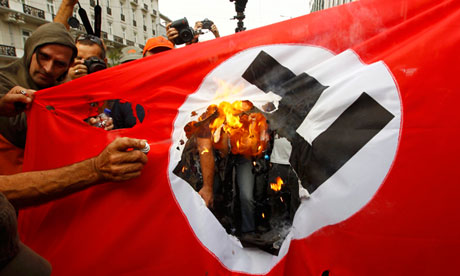

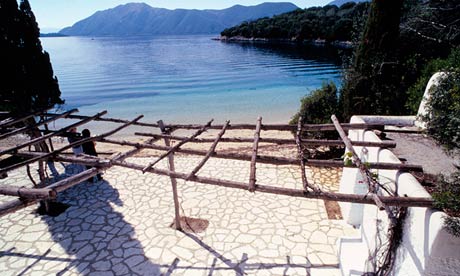

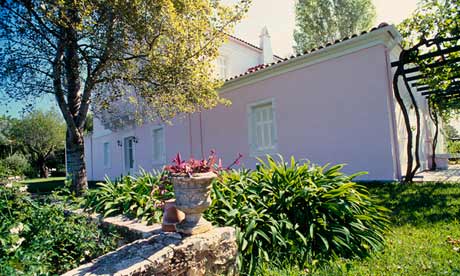


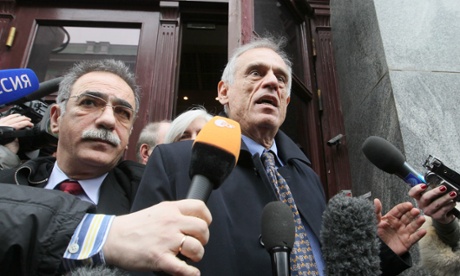
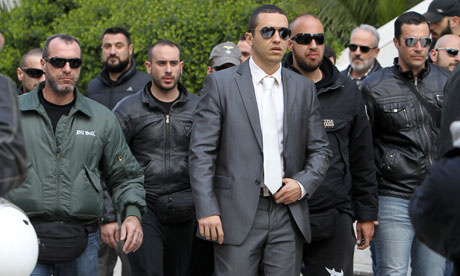 Golden Dawn MP Ilias Kasidiaris (centre) leaves an Athens court this month where he denied assisting in a 2007 assault and robbery. He has said the party will spread 'wherever there are Greeks'. Photograph: Thanassis Stavrakis/AP
Golden Dawn MP Ilias Kasidiaris (centre) leaves an Athens court this month where he denied assisting in a 2007 assault and robbery. He has said the party will spread 'wherever there are Greeks'. Photograph: Thanassis Stavrakis/AP 
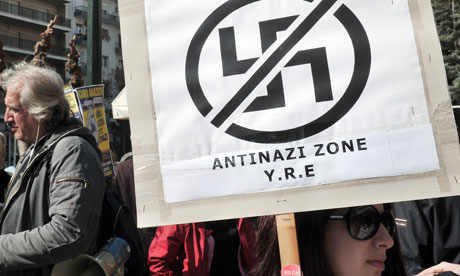 Anti-racist activists outside the appeals court in Athens this month for the case involving Golden Dawn MP Ilias Kasidiaris. Photograph: Louisa Gouliamaki/AFP/Getty
Anti-racist activists outside the appeals court in Athens this month for the case involving Golden Dawn MP Ilias Kasidiaris. Photograph: Louisa Gouliamaki/AFP/Getty 

